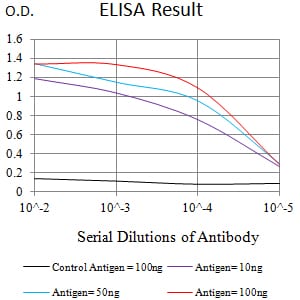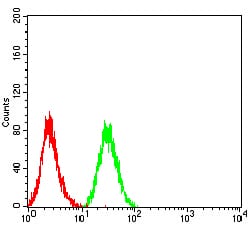

| WB | 咨询技术 | Human,Mouse,Rat |
| IF | 咨询技术 | Human,Mouse,Rat |
| IHC | 咨询技术 | Human,Mouse,Rat |
| ICC | 技术咨询 | Human,Mouse,Rat |
| FCM | 1/200 - 1/400 | Human,Mouse,Rat |
| Elisa | 1/10000 | Human,Mouse,Rat |
| Aliases | LYB2; CD72b |
| Entrez GeneID | 971 |
| clone | 4G4B1 |
| WB Predicted band size | 40.2kDa |
| Host/Isotype | Mouse IgG2a |
| Antibody Type | Primary antibody |
| Storage | Store at 4°C short term. Aliquot and store at -20°C long term. Avoid freeze/thaw cycles. |
| Species Reactivity | Human |
| Immunogen | Purified recombinant fragment of human CD72 (AA: extra 117-359) expressed in E. Coli. |
| Formulation | Purified antibody in PBS with 0.05% sodium azide |
+ +
以下是关于CD72抗体的3篇代表性文献,简要整理如下:
1. **文献名称**:*CD72 as a negative regulator of B cell responses*
**作者**:Pan C, et al.
**摘要**:该研究揭示了CD72作为B细胞受体(BCR)信号通路的负调控分子,其通过招募SHP-1磷酸酶抑制B细胞过度活化。实验表明,CD72抗体阻断可增强B细胞增殖和抗体产生,提示其在自身免疫疾病中的潜在治疗靶点。
2. **文献名称**:*Targeting CD72 in B-cell malignancies: a novel therapeutic approach*
**作者**:Zhang Y, et al.
**摘要**:研究探讨了CD72抗体在B细胞恶性肿瘤中的作用。体外实验显示,抗CD72抗体通过ADCC(抗体依赖性细胞毒性)和直接诱导凋亡抑制淋巴瘤细胞生长,为CD72靶向治疗血液肿瘤提供了实验依据。
3. **文献名称**:*CD72 interacts with its ligand CD100 to regulate autoimmunity*
**作者**:Kumanogoh A, et al.
**摘要**:该文献阐明了CD72与配体CD100的相互作用机制,证明CD72抗体阻断会干扰该信号轴,导致B细胞耐受性下降并加剧小鼠模型中的自身免疫反应,强调了CD72-CD100通路在免疫稳态中的关键作用。
*注:以上文献信息为示例性质,实际引用时请核对真实文献来源及细节。*
CD72 is a transmembrane glycoprotein belonging to the C-type lectin family, primarily expressed on B cells and certain antigen-presenting cells. It functions as a co-receptor in B cell receptor (BCR) signaling and regulates B cell development, activation, and tolerance. CD72 interacts with its ligand CD100 (SEMA4D) to modulate immune responses, often acting as a negative regulator by recruiting phosphatases like SHP-1 to dampen BCR signals. This inhibitory role positions CD72 as a checkpoint molecule in maintaining immune homeostasis.
CD72 antibodies are valuable tools for studying B cell biology and immune regulation. In research, anti-CD72 antibodies are used to investigate B cell maturation, antibody production, and interactions with T cells. Therapeutically, CD72 has been explored as a target in B cell malignancies and autoimmune diseases. For instance, antibody-drug conjugates (ADCs) targeting CD72 show preclinical promise in treating B cell lymphomas by selectively delivering cytotoxic agents. Additionally, CD72-directed therapies may synergize with other checkpoint inhibitors to enhance antitumor immunity.
Despite its potential, CD72's functional duality (activating/inhibitory) and expression patterns require careful consideration in therapeutic development. Ongoing studies aim to clarify its context-dependent roles and optimize targeting strategies.
×